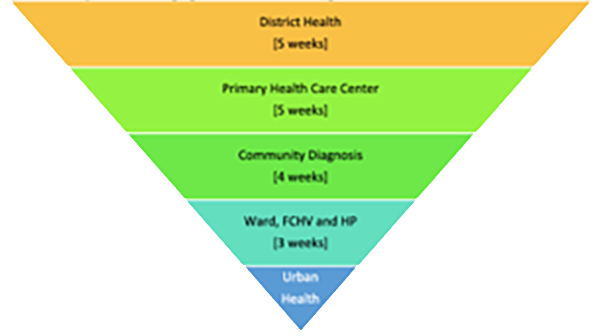Department of Community Health Sciences
PAHS has envisioned its medical graduates to be an important player and role model in improving the overall health care system of Nepal. They are intended to be not only technically competent but also socially liable. The academy sturdily believes that its graduate should also hold a firm understanding on social determinants of health in order to make a significant impact on the health of people. Thus, Department of Community Health Sciences (DCHS) was formed with an aim to contribute in achieving overall goal of PAHS as well as to inculcate various attributes including compassion, empathy, caring and social responsibilities in its graduates.
CHS Curriculum
Rather than merely a discipline, CHS, in fact, is a bundle of disciplines that includes subjects such as Epidemiology, Biostatistics, Demography, Research, Society Culture and Health, Ecologic Health, Health Education Promotion, Family Health, Food and Nutrition, and Management Sciences for Health Professionals. These courses are integrated throughout the undergraduate medical curriculum that starts from the beginning and runs longitudinally till the final year of the course. It comprises of both Didactic sessions, Problem Based Learning, practical sessions and Community Based Learning and Education (CBLE). The CHS curriculum covers approximately 20% of the total MBBS curriculum.
Community Based Learning and Education
DCHS has adopted an approach of Community Based Learning and Education (CBLE) as one of the principal strategies and teaching-learning methods. A significant part of the CHS course is covered in communities through residential and non-residential community rotations. CBLE is meticulously designed in such a way that it provides opportunities for the student to understand social, demographic, economic, environmental and cultural aspects of people’s life and their relationships with health and disease in real life settings. Students at PAHS get an unmatched and incredible learning opportunity to experience about the health care system of Nepal, reflect their role and possible contribution to improve the existing system. This approach allows the students to get first-hand opportunities to hear from the community, keep their feet grounded in the real-life setting and encourage in developing an attitude of compassion and desire to contribute to the society.
Community Based Learning and Education
The extent, intensity and approach of community engagement integrated in PAHS undergraduate medical curriculum is notably higher and inventive than other medical schools in the country. During the MBBS course, students have multiple community rotations with each rotation having a definite set of objectives that allows student to understand health system from different tiers, in a spiral manner, ranging from understanding urban health issues, female community health volunteers, community-based groups and organizations working in a grass root level to district health office. Depending upon the specific objectives of each rotation, duration of their community engagement ranges from a week to months.

